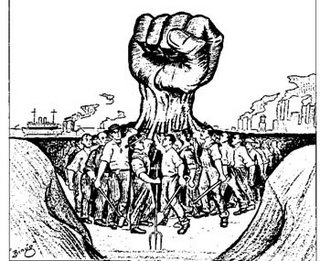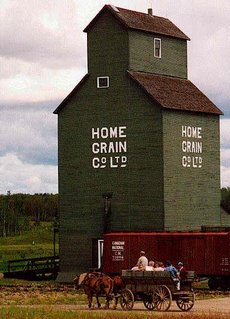See;Harpers Pre Depression Farm Plan
Then in 1998, in response to farmer pressure for the CWB to be more accountable to farmers, one of the most significant changes in the history of the CWB occurred. On December 31, 1998, a 15-member Board of Directors assumed overall governance responsibility for the CWB and a single full-time President and CEO was appointed. Ten of the members of the Board of Directors are elected by Prairie grain farmers and five of them, including the President and CEO, are appointed by the federal government. Under the new "shared governance" corporate structure the CWB is much more at arms' length from the federal government than it was previously and is more directly accountable to the farmers it serves.
This small group of rightwing farmers, mostly from the Mormon and Dutch Reform communities in Southern Alberta and Saskatchewan, who came here after the great depression and who live on the border, insist on instituting a dual desk program, that is open borders for them to bargain directly for their 'own' wheat without having to sell it to the CWB.
Harper supports this. But in Eastern Canada he says no such thing, he in fact embraces the sole monopoly power of the Supply Management system.
So which is it Mr. Harper a dual desk for all of Canada's farm products or just a discriminaTORY policiy of supporting your Alberta Right Wing rump and only trying to destroy the sixty year old Wheat Board?
Stephen Harper: But this government's best proposals are always the ones that never actually took place. Let me just outline some other things we'll do. We're going to continue to defend supply management in the international bodies and the three pillars of supply management. This is the one sector of agriculture that has actually been from time to time making a profit in the last few years. We want to defend it. We want to make sure that our farmers get market access. We're going to fight for that in trade negotiations. I should just add about the wheat board. Prairie farmers have been arguing for dual marketing options and that's the system we want to see.
Moderator: Mr. Martin, you've got a 30-second rebuttal.
Paul Martin: We voted very strongly for supply management. In fact, there was only one party leader who did not show up to support supply management, and that was Mr. Harper, and he was in town that day.Here is the Globe and Mail blog take on Harpers farm debate last night.
Brian Milner, 9:03 p.m. That's a joke. Martin loves the dairy and poultry farmers in Quebec and Ontario, because he keeps protecting their subsidized incomes and shelters them from competition.
Marcus Gee, 9:05 p.m. The sad fact is that all 4 parties have folded under the weight of the farm lobby, even the free marketing Tories.
Brian Milner, 9:05 p.m. I'll say. Listen to Harper defend supply management.
Mary Janigan, 9:06 p.m. "This government's best proposals are the ones that never actually took place." Great line from Mr. Harper. But all of them are claiming roots in the land -- when many farmers are now agri-businesses. And should be.
Marcus Gee, 9:08 p.m. This is weird -- a one time neo-con, Harper, vowing to protect the already over protected farm market. I wish he'd sound even a little bit of like the conservative he is.
| |
| Feature: |
| |
| You are here: Home > Features > The Canadian Wheat Board |
| |
| Jump to . . . |
| » Introduction » What's the Wheat Board? » History of Regulation » Structure of the Board » Wheat Board Effective? » Internal Pressures » External Pressures » Links and Further Info |
Internal Pressures on the Canadian Wheat Board
Do Western farmers need the Canadian Wheat Board?
The Canadian Wheat Board has its critics. Despite the fact that farmers were the driving force behind its creation, organizations representing groups of farmers are actively lobbying for significant changes to, or the outright abolition of, the Wheat Board.
These groups have voiced a number of concerns over the Board’s structure and operation:
Monopoly over the marketing of grain
Some argue that the original concept behind the Canadian Wheat Board, that a single organization will have more power negotiating contracts for the sale of grain than individual farmers, no longer holds true. Changes in technology mean that farmers can use computers to obtain up-to-the-minute data on grain prices. Under a more open system, farmers (or groups of farmers) could then use this data to obtain the best possible price for their grain, whether by selling it to buyers over the Internet, transporting it across the border to sell to US markets, or through some other method.
Others have argued, however, that the ability to obtain the most recent data on wheat and barley prices does not necessarily give farmers the skills required to sell these grains in a competitive marketplace.
Does Canada Really Have a Monopoly?
Furthermore, some argue that Canada’s ability to obtain the best possible price for farmers in the international market is limited. While Canada has a monopoly over the marketing of the majority of wheat that is commercially grown in Canada, it does not have a worldwide monopoly over wheat sales. Canada accounts for less than 20 percent of the worldwide wheat export market, which means that it must compete with other sellers when setting prices. Setting prices too high will reduce sales.
The Canadian Wheat Board’s position is that while Canada does not have a monopoly over worldwide wheat exports, Western Canada’s wheat and barley are respected around the world for their superior quality. Therefore, having a monopoly over the selling of these two grains, and not having to compete with other sellers, helps the Canadian Wheat Board obtain the best possible price for farmers. Furthermore, combined with “Single Desk Selling,” a monopoly allows the CWB to price differently to different markets on any given day. This allows the Board to sell wheat to one customer at a lower price (in order to secure a sale), without being threatened with the loss of “premium markets” that are charged a higher price.
Voluntary versus Mandatory Participation in the Canadian Wheat Board: “Buy-back” Licenses
A particularly sore point with many farmers involves the issue of “buy-back” licences. A farmer wishing to sell his wheat or barley to a third party (for example, by transporting his grain across the border to take advantage of higher prices in the United States) must first deliver the grain to the Canadian Wheat Board and buy it back again. The price charged for the farmer to purchase the grain (the price that the Canadian Wheat Board would charge to sellers on that particular day) essentially removes any advantage that would be gained from selling it to a third party. Furthermore, Canadian Wheat Board officials are free to refuse the farmer’s request for a buy-back license.
The Canadian Wheat Board’s position is that buy-back licenses are consistent with the philosophy of price pooling, whereby all farmers who deliver wheat during the crop year share in the profits. Requiring farmers to purchase a buy-back license allows other farmers to share in the proceeds from the sale.
Price Pooling
Some argue that the system of price pooling, like any bureaucratic system, inevitably leads to a time lag between receiving information about market conditions and acting on that information, both at the micro and macro level. At the micro level, since they are receiving the pooled price for their grain and not the market price, farmers may be slow to respond to changes in demand. In the 1994/95 crop year, the CWB was unable to undertake a potentially lucrative contract to supply Japan with barley, as it could not attract enough barley into the pool to fill the contract. At the macro level, it can lead to poor marketing decisions, such as selling grain to the export market when it would have received a higher price on the domestic market, and vice versa.
The Canadian Wheat Board’s position is that any financial losses that may have been experienced in specific cases are minor compared to the overall financial benefits to farmers of the system of price pooling and single desk selling.
Alternatives to the Canadian Wheat Board – An Open System or Dual Marketing?
Some critics of the Canadian Wheat Board call for a completely open system, in which wheat and other grains are bought and sold on the open market. Others favour a “dual marketing” system, where farmers could choose between selling their wheat independently and participating in the Canadian Wheat Board. The Canadian Wheat Board’s position is that, as with any other monopoly, being the sole provider of Western wheat gives it greater clout in negotiating the best possible price for the product. Furthermore, the system of “price pooling,” whereby all farmers share equally in the risk, could not continue if the CWB was in direct competition with other grain sellers. Therefore, a dual market is neither practical nor in farmers’ best interests.
Supporters of dual marketing point out, however, that a type of dual market operated successfully in the 1920s, when approximately one-half of Prairie farmers participated in provincially run Wheat Pools, while the remainder marketed their own grain. Furthermore, they argue that a dual marketing system exists in Ontario, where farmers have a choice between selling their wheat themselves, or through the Ontario Wheat Producers’ Marketing Board. The Canadian Wheat Board acknowledges that Ontario farmers have more flexibility in choosing how to market their wheat, but point out this does not necessarily lead to higher profits.
Do Farmers Support the Canadian Wheat Board?
In recent years, several polls have been conducted to gauge the level of support for the Canadian Wheat Board among farmers. The results illustrate the lack of a clear consensus among farmers as to the future direction of wheat marketing in Canada:
- A 1997 non-binding referendum, conducted by the Canadian Wheat Board, found that 63 percent of barley farmers preferred a single market for barley, while 37 percent preferred an open market.
- A 2003 poll conducted by Ipsos-Reid found that 64 percent of Alberta wheat growers would like to see changes to the way their wheat is currently marketed.
- The same poll found that 68 percent of Alberta barley growers would like to see changes to the way their barley is currently marketed.
- A 2005 poll conducted by Ipsos-Reid found that 48 percent of wheat farmers preferred the current “single desk” market for wheat, while 46 percent supported the implementation of a “dual market.”
- The same poll found that, in the absence of a dual market, 64 percent of wheat farmers preferred the current system over a completely open market.
- With respect to barley farmers, the 2005 poll found that 56 percent of barley farmers preferred a dual market, while 32 percent supported the “single desk” market.
- In the absence of a dual market, the same poll found that 53 percent of barley farmers prefer an open system without the Canadian Wheat Board.
Tags
Canada
Federal Election
Politics
Leaders Debate
Harper
CWB
Wheat Board
farming
Supply Side Management
Conservatives





